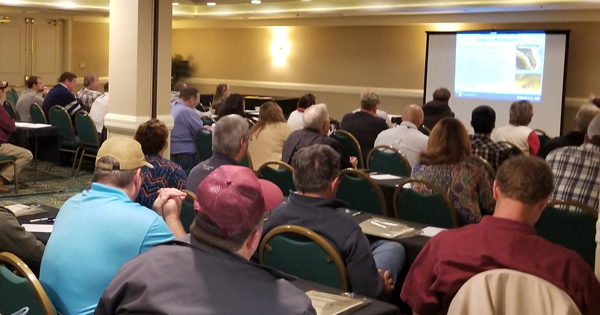


Mid-Atlantic Crop School
Photo by Jarrod Miller January 17, 2018
UD Extension offers instruction to crop consultants as part of annual Mid-Atlantic Crop School
The University of Delaware’s Cooperative Extension teamed with professors and extension professionals from the University of Maryland and other regional land grant universities and the United States Department of Agriculture’s (USDA) Natural Resources Conservation Service (NRCS) to offer continuing education credits for certified crop advisers at the Mid-Atlantic Crop School held in late November in Ocean City, Maryland.
The Mid-Atlantic Crop School has been operating for over 20 years and offers continuing education credits over a two-and-a-half-day period in the five areas that certified crop advisers are required to gain knowledge: crop management, pest management, soil and water management, nutrient management and also sessions on professional development or an innovative topic.
Other Universities involved with the Mid-Atlantic Crop School include West Virginia University and Virginia Tech.
In addition to offering the certified crop adviser credits, the school also offers Delaware, Maryland, Virginia, New Jersey and Pennsylvania nutrient management and pesticide credits for state programs.
Amy Shober, associate professor in the Department of Plant and Soil Sciences and a Cooperative Extension specialist, said that there were around 275 participants this year and that the school is mostly geared towards technical service providers, nutrient management plan writers and crop consultants who advise farm clientele and need the credits to achieve or renew their certification.
In addition, Jarrod Miller, assistant professor in the Department of Plant and Soil Sciences and an extension specialist in agronomy, said that Extension personnel also attend the sessions in order to stay up to date.
“Sometimes you can read papers on certain topics but there’s nothing like sitting in a room with the expert. We get NRCS personnel and representatives from both the Maryland and Delaware departments of Agriculture who show up,” said Miller.
The school features local speakers from regional universities, and also national speakers.
“Some of the courses are similar to what an undergrad might get at the University of Delaware. It’s basic and applied but other times it’s a recent problem. We have pesticide resistance issues or maybe we’ll have a new method of applying nutrients,” said Miller. “Precision agriculture is a big one so this year we had talks on drones because that’s a newer topic. We also had an economic session which was very popular.”
Other topics covered included salt water intrusion, soil compaction, and managing different pests depending on the crop.
Shober said that the session led by Douglas Beegle, Emeritus Distinguished Professor of Agronomy from Pennsylvania State University, on soil acidity and liming was very beneficial.
“He always gives great fundamental talks. Kind of going back to the basics and refreshing everybody’s memories. He gave a great talk this year. I feel like [soil acidity and liming] is a topic that I feel pretty comfortable with and I walked away from that talk with new information,” said Shober.
Contact Us
Have a UDaily story idea?
Contact us at ocm@udel.edu
Members of the press
Contact us at 302-831-NEWS or visit the Media Relations website

